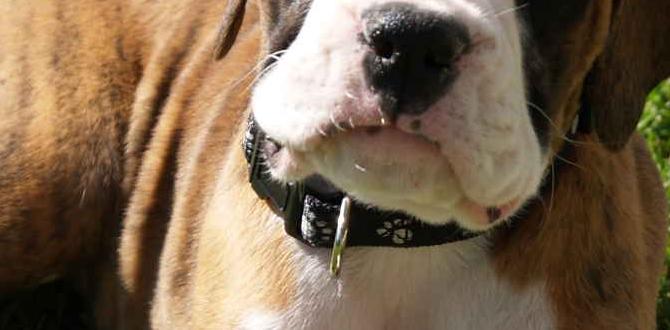Have you ever been woken up by a tiny, sad cry in the night? If you have a puppy, you might know this feeling all too well. Many new puppy owners face the same challenge—dealing with a puppy that won’t stop crying at night. It can make you feel worried and helpless. You just want your little friend to be happy and comfortable.
Imagine this: you’ve just brought home a playful puppy. You’re excited, and you can’t wait to cuddle and play. But then nighttime comes, and suddenly, the fun ends. Your puppy starts to cry. It’s loud and constant. You wonder why this is happening. Is your puppy scared? Is it feeling lonely? These questions can make it tough for both you and your furry companion.
Don’t worry! You are not alone. Many puppy owners have faced this issue. Understanding why your puppy won’t stop crying at night is the first step. Once you know the reasons, you can help your puppy feel more secure. Join us as we explore easy tips and tricks to give your puppy a peaceful night’s sleep.
Why Your Puppy Won’T Stop Crying At Night: Solutions And Tips

Puppy Won’t Stop Crying at Night
Many new puppy owners face sleepless nights. Puppies cry at night for several reasons, such as loneliness or fear. Did you know that a warm blanket or a soft toy can help comfort them? Creating a cozy sleeping area also makes a big difference. Establishing a bedtime routine can reassure your puppy and build their confidence. Patience and love are key in helping your furry friend adjust to their new home. Remember, they’re just little ones trying to find their way!Common Reasons for Nighttime Crying
Separation anxiety and its impact on puppies. Physical discomfort or healthrelated issues.Puppies cry at night for many reasons. One main cause is separation anxiety. Puppies miss their mothers and siblings, feeling lonely. It can be tough for them! Another reason could be physical discomfort. Puppies might feel hot, cold, or hungry. They can also have health issues causing pain. It’s essential to check if your puppy is well. Understanding these reasons can help make nighttime peaceful for you and your puppy.
Why does my puppy cry at night?
Your puppy may cry at night due to anxiety or discomfort. Addressing these issues can help them feel safer and more comfortable.
Common Reasons for Crying:
- Separation anxiety from family
- Feeling hot or cold
- Hunger or thirst
- Health problems causing pain
Understanding Your Puppy’s Needs
The importance of socialization and companionship. Addressing hunger, thirst, and bathroom needs.Puppies cry at night because they need love and care. They are social animals and feel lonely without friends. Providing companionship is very important. This helps them feel safe.
- Make sure your puppy has enough food and water.
- Check if they need to go outside.
Your puppy may cry because of hunger or thirst. Meeting these needs helps them sleep better and stop crying. Don’t forget, they need comfort too!
Why does my puppy cry at night?
Puppies cry at night due to loneliness or discomfort. They may need food, water, or to go outside. Addressing these needs will help them feel safe and secure.
Creating a Comfortable Sleeping Environment
Best practices for a cozy dog sleeping area. The role of bedding, temperature, and noise in comfort.Creating a cozy sleeping area for your puppy can help them feel safe and calm at night. Start with a soft, warm bed that suits their size. It should feel snug, just like being with their mom. Keep the room at a comfy temperature—between 68-72°F is best. Also, reduce loud noises. Puppies sleep best in quiet spaces, away from distractions.
- Choose a warm and cozy bed.
- Maintain the right temperature.
- Use quiet blankets to muffle noise.
How can I help my puppy sleep better at night?
Provide a cozy bed, keep the room warm, and minimize noise for better sleep.
Little steps can lead to a good night’s sleep for your puppy. Happy pups are quiet pups!
Training Techniques to Reduce Nighttime Crying
Effective crate training methods to soothe anxiety. Positive reinforcement strategies for calming.Helping your puppy feel safe at night is key to stopping their crying. Crate training is an excellent method. Start by making the crate cozy with a soft blanket and toys. Gradually introduce your puppy to the crate, using short periods at first. Positive reinforcement works wonders too. Reward them with treats or praise when they stay calm. This builds a sense of trust and comfort. Remember, patience is important. Your puppy will learn to feel secure with time.
What are effective crate training methods?
To crate train successfully, focus on these steps:
- Create a cozy space inside the crate.
- Introduce the crate slowly, keeping the door open.
- Use treats as rewards for entering the crate.
- Gradually close the door for short periods.
How can positive reinforcement calm my puppy?
Positive reinforcement helps your puppy connect good behavior with rewards. Use treats, praise, or playtime to calm your puppy when they’re quiet. This way, they learn that staying calm brings them joy. Create a daily routine to help them feel secure at night.
When to Seek Professional Help
Signs that indicate a need for veterinary consultation. Finding the right puppy trainer or behaviorist.Sometimes, your puppy’s cries may need more than just a snuggle. Look for signs like excessive crying, refusal to eat, or hiding away. These could mean something isn’t right. If your furry friend shows these signs, it’s time to call the vet! Also, finding a good trainer can be a game changer. They can teach your puppy to chill out at night. Remember, a tired puppy equals a happy owner, right?
| Signs to Watch For | What They Mean |
|---|---|
| Excessive whining | Possible discomfort or anxiety |
| Loss of appetite | Health issues or stress |
| Hiding | Fear or nervousness |
Comparing Solutions: What Works Best for Different Puppies?
Tailoring approaches based on breed and temperament. The role of age and previous experiences in crying behavior.Different puppies have unique needs. Some breeds are more vocal than others. For example, a Beagle may cry more due to its hunting background, while a Bulldog might snooze quietly. Age also matters—young pups often miss their moms and might feel lonely at night. Previous experiences can shake them up too. A pup from a shelter may need extra comfort. To help, owners can try different methods like these:
| Breed | Suggested Solution |
|---|---|
| Beagle | Provide a cozy crate with a toy that smells like home. |
| Bulldog | Use a calming blanket and some gentle music. |
| Rescue Pup | Snuggle up before sleep and keep a nightlight on. |
These simple steps can help your furry friend relax and enjoy dreamland. Remember, a happy pup means quieter nights!
Long-Term Strategies for Better Nighttime Routine
Establishing a consistent nighttime routine for your puppy. Incorporating exercises and playtime to tire out your puppy.To help your puppy feel more relaxed at night, having a set bedtime routine is key. Puppies thrive on consistency. Start with calming activities like cuddling or gentle petting. After some quiet time, add fun exercises to tire them out. You can take your puppy for a walk or play fetch. This ensures they have a satisfying day. A happy puppy is a sleepy puppy!
- Establish a regular bedtime.
- Include playtime before bed.
- Use soothing voices during quiet time.
How can I tire out my puppy before bed?
Engage your puppy in active play, like fetch or tug-of-war. This helps burn off energy and relax them for the night.
Conclusion
If your puppy won’t stop crying at night, don’t worry. It’s common for young pups. Ensure their needs are met—food, water, and comfort. Create a cozy sleeping space for them. You can also try calming techniques, like soft music or a warm blanket. For more tips, check out resources on puppy care. Together, we can help your puppy feel safe and happy!FAQs
What Are The Common Reasons A Puppy Might Cry At Night?Puppies might cry at night because they feel scared or lonely. They could be hungry or need to go outside. Sometimes, they are too hot or too cold. Make sure they have a cozy bed and enough food. Being close to you can also help them feel safe.
How Can I Help My Puppy Feel More Comfortable And Secure During Nighttime?To help your puppy feel safe at night, make a cozy place for them to sleep. You can use a soft blanket or a bed. Keep the room calm and quiet. You might also try playing soft music or using a nightlight. Spend some time with your puppy before bed so they feel loved and secure.
Are There Specific Training Techniques That Can Help Reduce A Puppy’S Nighttime Crying?Yes, there are ways to help your puppy stop crying at night. You can give your puppy a cozy bed and a favorite toy. Before bedtime, take your puppy out to go potty. Also, try to play with your puppy during the day so it’s tired at night. If your puppy cries, wait a moment before going to it, so it learns to settle down.
Should I Let My Puppy Cry It Out At Night, Or Should I Respond To Their Cries?You should respond to your puppy’s cries at night. They might be scared, hungry, or need to go outside. When you comfort them, it helps them feel safe. Over time, your puppy will learn to settle down and sleep better. Just be patient and gentle with them!
How Can I Establish A Bedtime Routine To Help My Puppy Sleep Through The Night?To help your puppy sleep at night, you can create a fun bedtime routine. First, play with your puppy for a little while to tire them out. Then, take them outside for potty time before bed. Next, give your puppy a cozy bed or blanket to sleep on. Finally, turn off the lights and say goodnight gently. This will help your puppy learn it’s time to sleep!
Meet Elyse Colburn, the devoted canine companion and storyteller behind the enchanting world of “Tales, Tails, and Adventures Unleashed.” A passionate dog enthusiast with a heart full of paw prints, Elyse Colburn shares heartwarming tales and insightful adventures, celebrating the joy, loyalty, and endless antics that make every dog a true hero. Join Elyse Colburn on this tail-wagging journey, where every post is a love letter to our four-legged friends.






